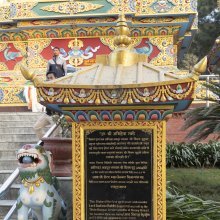Unmukha: 15 definitions
Introduction:
Unmukha means something in Hinduism, Sanskrit, Marathi, Hindi. If you want to know the exact meaning, history, etymology or English translation of this term then check out the descriptions on this page. Add your comment or reference to a book if you want to contribute to this summary article.
Alternative spellings of this word include Unmukh.
Images (photo gallery)
In Hinduism
Ayurveda (science of life)
Source: gurumukhi.ru: Ayurveda glossary of termsUnmukha (उन्मुख):—Upward looking face

Āyurveda (आयुर्वेद, ayurveda) is a branch of Indian science dealing with medicine, herbalism, taxology, anatomy, surgery, alchemy and related topics. Traditional practice of Āyurveda in ancient India dates back to at least the first millenium BC. Literature is commonly written in Sanskrit using various poetic metres.
Kavya (poetry)
Source: Brill: Śaivism and the Tantric Traditions (kavya)Unmukha (उन्मुख) refers to “yearning for (sensual things)”, according to Kālidāsa’s Raghuvaṃśa verse 9.78.—Accordingly: “Therefore, although the sun may fall to earth, or Himālaya lose its fixity, I’ll not return home like a common man, whose senses yearn for sensual things (viṣaya-unmukha-indriya), and who has not perceived the truth”.

Kavya (काव्य, kavya) refers to Sanskrit poetry, a popular ancient Indian tradition of literature. There have been many Sanskrit poets over the ages, hailing from ancient India and beyond. This topic includes mahakavya, or ‘epic poetry’ and natya, or ‘dramatic poetry’.
Languages of India and abroad
Marathi-English dictionary
Source: DDSA: The Molesworth Marathi and English Dictionaryunmukha (उन्मुख).—a S Having the face set towards, lit. fig.; about (to go or do). Ex. gamanōnmukha About to go; maraṇōnmukha About to die; prasavōnmukha, dānōnmukha, viṣayōnmakha, prayāṇōnmukha.
Source: DDSA: The Aryabhusan school dictionary, Marathi-Englishunmukha (उन्मुख).—a Having the face set towards.
Marathi is an Indo-European language having over 70 million native speakers people in (predominantly) Maharashtra India. Marathi, like many other Indo-Aryan languages, evolved from early forms of Prakrit, which itself is a subset of Sanskrit, one of the most ancient languages of the world.
Sanskrit dictionary
Source: DDSA: The practical Sanskrit-English dictionaryUnmukha (उन्मुख).—a. (-khī f.) [उद्-ऊर्ध्वं मुखं यस्य (ud-ūrdhvaṃ mukhaṃ yasya)]
1) Raising the face, looking up; °दर्शन (darśana) looking upwards; अद्रेः शृङ्गं हरति पवनः किंस्विदित्युन्मुखीभिः (adreḥ śṛṅgaṃ harati pavanaḥ kiṃsvidityunmukhībhiḥ) Meghadūta 14,15; R.1.39,11.26; आश्रम° (āśrama°) 1.53.
2) Ready, intent on, on the point of, about to, prepared for; तमरण्यसमाश्रयोन्मुखम् (tamaraṇyasamāśrayonmukham) R.8.12 about to retire to the woods; 16.9,3.12; उदयोन्मुख- चन्द्रिका (udayonmukha- candrikā) M.5.7; भेदोन्मुखम् (bhedonmukham) V.2.7; Kumārasambhava 6.48.
3) Eager, waiting for, expecting, looking up to; तस्मिन् संयमिनामाद्ये जाते परिणयोन्मुखे (tasmin saṃyamināmādye jāte pariṇayonmukhe) Kumārasambhava 6.34; लक्ष्मीरिव गुणोंन्मुखी (lakṣmīriva guṇoṃnmukhī) R.12.26,6. 21,11.23.
4) Sounding, speaking or making a sound; परभृतोन्मुखी (parabhṛtonmukhī) Kumārasambhava 6.2 speaking through the cuckoo.
5) Coming from the mouth (mukhotpanna); यस्तून्मुखत्वाद्वर्णानां मुख्योऽभूद् ब्राह्मणो गुरुः (yastūnmukhatvādvarṇānāṃ mukhyo'bhūd brāhmaṇo guruḥ) Bhāgavata 3.6.3.
Source: Cologne Digital Sanskrit Dictionaries: Shabda-Sagara Sanskrit-English DictionaryUnmukha (उन्मुख).—mfn.
(-khaḥ-khā-khaṃ) Looking upwards. E. ut up, mukha the face.
Source: Cologne Digital Sanskrit Dictionaries: Benfey Sanskrit-English DictionaryUnmukha (उन्मुख).—adj., f. khī, 1. with the face turned upward, [Vikramorvaśī, (ed. Bollensen.)] 61, 17. 2. directed to, towards, [Pañcatantra] 141, 17. 3. desiring, [Vikramorvaśī, (ed. Bollensen.)] [distich] 26 (
Unmukha is a Sanskrit compound consisting of the terms ud and mukha (मुख).
Source: Cologne Digital Sanskrit Dictionaries: Cappeller Sanskrit-English DictionaryUnmukha (उन्मुख).—[feminine] ī looking or turned (lit. having the face) upwards; looking at, desirous of, going or about to, waiting for (—°).
Source: Cologne Digital Sanskrit Dictionaries: Monier-Williams Sanskrit-English Dictionary1) Unmukha (उन्मुख):—[=un-mukha] mf(ī)n. (ud-mu) raising the face, looking up or at, [Suśruta; Meghadūta; Kumāra-sambhava; Kathāsaritsāgara; Pañcatantra] etc.
2) [v.s. ...] waiting for, expecting, [Rāmāyaṇa; Kumāra-sambhava; Kathāsaritsāgara] etc.
3) [v.s. ...] near to, about to, [Vikramorvaśī; Bhartṛhari; Varāha-mihira’s Bṛhat-saṃhitā] etc.
4) [v.s. ...] m. Name of an antelope (supposed to have been a Brāhman and hunter in former births), [Harivaṃśa 1210.]
Source: Cologne Digital Sanskrit Dictionaries: Yates Sanskrit-English DictionaryUnmukha (उन्मुख):—[(khaḥ-khā-khaṃ) a.] Looking up.
Source: DDSA: Paia-sadda-mahannavo; a comprehensive Prakrit Hindi dictionary (S)Unmukha (उन्मुख) in the Sanskrit language is related to the Prakrit word: Ummuha.
[Sanskrit to German]
Sanskrit, also spelled संस्कृतम् (saṃskṛtam), is an ancient language of India commonly seen as the grandmother of the Indo-European language family (even English!). Closely allied with Prakrit and Pali, Sanskrit is more exhaustive in both grammar and terms and has the most extensive collection of literature in the world, greatly surpassing its sister-languages Greek and Latin.
Hindi dictionary
Source: DDSA: A practical Hindi-English dictionaryUnmukha (उन्मुख) [Also spelled unmukh]:—(a) inclined, disposed (towards); intent.
...
Kannada-English dictionary
Source: Alar: Kannada-English corpusUnmukha (ಉನ್ಮುಖ):—
1) [adjective] facing upward; (face) turned upwards.
2) [adjective] facing; coming toward; approaching.
3) [adjective] disturbed by fear, impending danger, uncertainty, etc.; anxious.
4) [adjective] ready; prepared.
Kannada is a Dravidian language (as opposed to the Indo-European language family) mainly spoken in the southwestern region of India.
See also (Relevant definitions)
Partial matches: Mukha, Ud, Un.
Starts with: Unmukhadarshana, Unmukhara, Unmukharamukhara, Unmukhata, Unmukhavade, Unmukhavagu.
Ends with: Anunmukha, Arumukha, Bhedonmukha, Maranonmukha, Phalonmukha, Pranayonmukha, Prasadonmukha, Prasavonmukha, Samunmukha, Sharanonmukha, Trishtunmukha, Udayonmukha, Vidyumukha, Vinashonmukha, Vishayonmukha.
Full-text: Unmukhata, Vinashonmukha, Aunmukhya, Samunmukha, Maranonmukha, Unmukhadarshana, Unmukhikarana, Unmukhikara, Ummuha, Prasadonmukha, Phalonmukha, Udayonmukha, Unmukh, Sharanonmukha, Pushkarini, Bhedonmukha, Prasavonmukha, Pranayonmukha, Unmukam, Indriya.
Relevant text
Search found 6 books and stories containing Unmukha, Ud-mukha, Un-mukha; (plurals include: Unmukhas, mukhas). You can also click to the full overview containing English textual excerpts. Below are direct links for the most relevant articles:
Brihad Bhagavatamrita (commentary) (by Śrī Śrīmad Bhaktivedānta Nārāyana Gosvāmī Mahārāja)
Verse 2.1.90 < [Chapter 1 - Vairāgya (renunciation)]
Verse 2.4.83-84 < [Chapter 4 - Vaikuṇṭha (the spiritual world)]
Verse 2.3.170 < [Chapter 3 - Bhajana (loving service)]
Cidgaganacandrika (study) (by S. Mahalakshmi)
Verse 19 [Ambā in Dual and non-dual aspect] < [Chapter 1 - First Vimarśa]
Sahitya-kaumudi by Baladeva Vidyabhushana (by Gaurapada Dāsa)
Text 7.132 < [Chapter 7 - Literary Faults]
Bhajana-Rahasya (by Srila Bhaktivinoda Thakura Mahasaya)
Text 19 < [Chapter 2 - Dvitīya-yāma-sādhana (Prātaḥ-kālīya-bhajana)]
Text 11 < [Chapter 1 - Prathama-yāma-sādhana (Niśānta-bhajana–śraddhā)]
Mahabharata (English) (by Kisari Mohan Ganguli)
Section LXVI < [Anugita Parva]
Shri Gaudiya Kanthahara (by Srila Bhaktisiddhanta Sarasvati)
